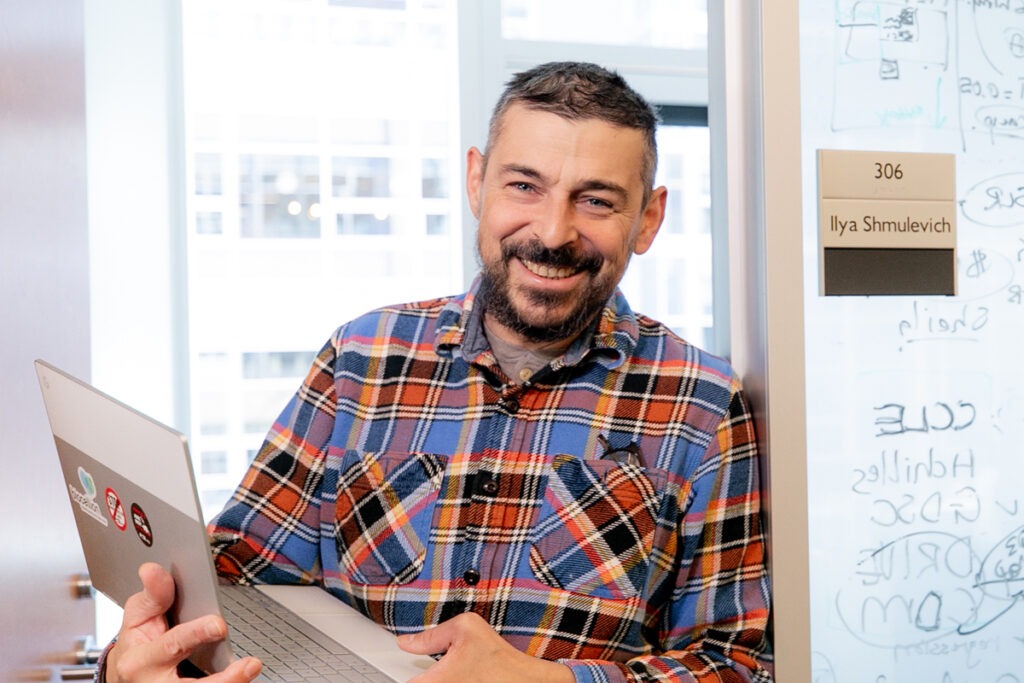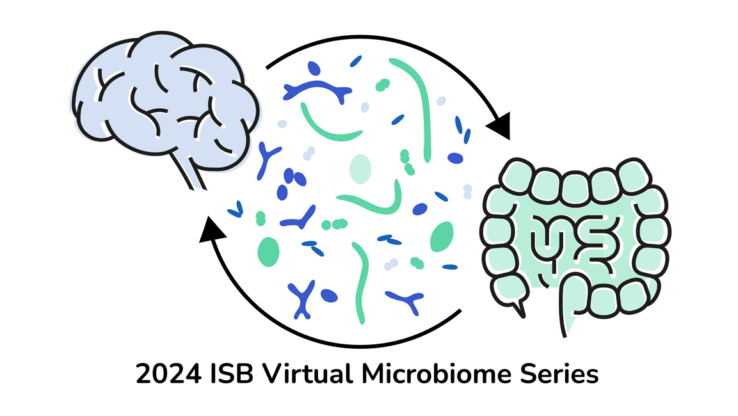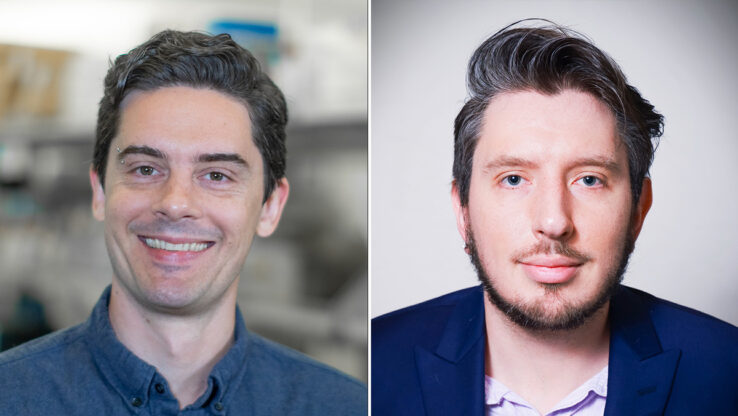2024 Year in Review
 gibbons.isbscience.org/news/2024/12/09/2024-year-in-review/
gibbons.isbscience.org/news/2024/12/09/2024-year-in-review/
ISB reflects on 2024 with much to celebrate: groundbreaking research published in leading scientific journals, well-earned promotions, widespread media coverage, and more.
Yet, the year was profoundly marked by the loss of our beloved colleague and friend, Dr. Ilya Shmulevich, who passed away in April at age 54 from complications of acute myeloid leukemia.
“Ilya’s impact on his lab, fellow faculty, ISB as a whole, and all who had the pleasure of knowing him cannot be adequately expressed. He was an outstanding scientist, mentor, colleague, collaborator, and friend,” said ISB President Dr. Jim Heath.

Dr. Ilya Shumlevich in front of his office door at ISB in November 2023. (Scott Eklund/Redbox Photography)
“He led a life like no other, and we will never forget him,” added ISB Co-founder and Professor Dr. Lee Hood.
In June, ISB hosted a celebration of life for Ilya’s friends, colleagues, and family. In October, we honored his legacy with “Resonance,” a scientific symposium celebrating his life and groundbreaking contributions to science.
Dr. Shmulevich’s memory and legacy will forever be a part of ISB.
Please read on for our year-in-review roundup highlighting our most important, interesting, and impactful highlights of 2024. You can scroll through, or click the links below on the section that interests you most.
Research | Awards & Honors | Events | Media Coverage
Research
Bowel Movement Frequency and Overall Health
Everybody poops, but not every day. Research out of the Gibbons Lab suggests bowel movement frequency is linked to long-term health. The researchers examined the clinical, lifestyle, and multi-omic data of more than 1,400 healthy adults. How often people poop, they found, can have a large influence on one’s physiology and health. Read our news story here.
Microbiome-Informed Precision Nutrition
Short-chain fatty acids (SCFAs) are beneficial molecules created by the bacteria residing in our gut that are closely tied to improved host metabolism, lower systemic inflammation, better cardiovascular health, lower cancer risk, and more. However, SCFA profiles can vary widely between individuals consuming the same diet. Researchers in the Gibbons Lab have built a “digital twin” of gut microbiome metabolism that can simulate personalized responses to diet by using gut microbiome sequencing data and information on dietary intake to constrain each individual-specific model. Read our news story here, and watch a video with Dr. Sean Gibbons and Dr. Nick Quinn-Bohmann below.
Common Immune Response Protective Across Many Diseases
Combined, infection, autoimmunity and cancer account for four out of every 10 deaths worldwide, and represent major global health challenges. In a paper in the journal Cell Reports, Heath Lab researchers highlighted a novel discovery of how the human immune system works in common ways across diseases, and offer promising avenues for exploring multi-disease therapeutic strategies. Read our news story here, and watch a video conversation between Daniel Chen and Dr. Jim Heath below.
AI’s Potential and Pitfalls
ISB researchers have gained new insights into the strengths and limitations of using artificial intelligence (AI) to identify social determinants of health from electronic health records. Members of the Hadlock Lab, collaborating with Providence, leveraged large language models (LLM) developed from generative pre-trained transformers (GPT). The researchers highlighted the strengths of LLMs in uncovering social determinants of health but underscored the need for human oversight and improved data de-identification methods. Read our news story here.
How Glioblastoma Resists Treatment
Glioblastoma is one of the deadliest and most aggressive forms of primary brain cancer in adults and is known for its ability to resist treatment and to recur. Baliga Lab researchers have made breakthrough discoveries in understanding the mechanisms behind acquired resistance, focusing on a rare and stubborn group of cells within tumors called glioma stem-like cells. Read our news story here.
Advancing Informal STEM Learning
An ISB-led study unveiled important insights and actionable protocols for providing equitable STEM experiences for high school students from historically marginalized communities. Claudia Ludwig and colleagues demonstrated significant gains among high school students participating in in-person and remote informal STEM programs, ranging from 22 to 320 hours in length. Key factors contributing to this success include authentic research experiences, connections with STEM professionals, hands-on projects, and collaborative group work. Read our news story here, and watch Ludwig discuss her work in the video below.
Microbes Evolve to Spatially Divide and Conquer
Researchers in the Baliga Lab examined representative organisms of two classes of microbes whose interaction contributes to the conversion of more than 1 gigaton of carbon into methane every year. They showed that ecotypes of the same species can emerge over very short evolutionary timescales to specialize and collaborate with ecotypes of other species to significantly increase the productivity of ecologically important functions like methane production. Read our news story here.
Autoimmune Disease and Pregnancy
For many aspiring mothers with autoimmune diseases, pregnancy can be daunting and full of unknowns. In some cases, those suffering from specific autoimmune conditions have chosen to forego pregnancy altogether due to concerns about their disease treatments and adverse pregnancy outcomes. In a study in the journal Lancet eClinical Health, Hadlock Lab researchers showed nuanced pregnancy outcomes for pregnant individuals with autoimmune diseases. The findings reinforce that there isn’t a one-size-fits-all approach, and provide important new avenues for further investigation. Read our news story here, and watch a video featuring Dr. Jennifer Hadlock below.
Awards and Honors
Dr. Sean Gibbons and colleagues were awarded a 2024-2025 Amazon Web Services IMAGINE Grant for Nonprofits. The grant will support the Gibbons Lab’s continued development of My Digital Gut. This online decision-support platform will help make microbiome-informed nutrition and healthcare personalized, predictive, and preventive. Read our news story here.
Dr. Wei Wei, an accomplished cancer researcher with expertise in biotechnology and cancer systems biology, was promoted to ISB associate professor. “I am deeply honored by this promotion, and I am excited to continue our efforts – harnessing systems biology thinking and approaches to push the boundaries of fundamental and translational cancer research,” Wei said. Read our news story here.
Dr. Sid Venkatesh is the co-first author of a paper in the journal Science. Following his 2019 work, where he co-led the development of a new class of nutritional interventions, microbiota-directed complementary foods (MDCFs), Venkatesh and Dr. Jiye Cheng (co-first author on the recent paper) identified a novel gut microbial enzyme that impacts satiety-related signaling pathways in undernourished children treated with MDCFs. Venkatesh made the discovery as a postdoctoral research associate in Dr. Jeffrey I. Gordon’s laboratory at Washington University in St. Louis. Read our news story here.
Faduma Hussein joined the ISB Education team as the Public Health Ambassador Coordinator, becoming only the fourth AmeriCorps member to serve at ISB. Hussein plans to help high school students develop their systems thinking skills to improve the overall health of their communities. Read our Q&A with Faduma Hussein here.
Events
TOWN HALL SEATTLE
ISB has had a long and successful partnership with Town Hall Seattle. In 2024, we co-produced a fun and informative event with Town Hall that brought together an award-winning Netflix director and her scientific advisor – our very own Sean Gibbons.
Hack Your Health: An Evening with Anjali Nayar and Dr. Sean Gibbons
The popular Netflix documentary “Hack Your Health: The Secrets of Your Gut” was released in April. The film merged world-renowned gut microbiome experts, four individuals facing personal battles with gastrointestinal health, and a unique, effective visual method of “showing” the gut microbiome in action, resulting in a scientifically accurate and ultimately understandable narrative accessible to all audiences. In June, ISB and Town Hall Seattle coordinated to put on a panel discussion with “Hack Your Health” Director Anjali Nayar and Sean Gibbons, who served as the scientific advisor on the documentary. Read our news story here, and watch the video of the presentation below.
RESEARCH ROUNDTABLE
We host the Research Roundtable virtual series to keep you updated on the novel research happening at ISB. In 2024, we hosted three interesting and varied roundtables.
Precision Cancer Care Faster Than Ever
Dr. Wei Wei and his colleagues have developed a promising new companion diagnostic tool called MetaboCore to help physicians quickly select the most effective systemic therapy to get the right drug to the right cancer patient at the right time. Read our news story here, and watch the video below.
A Digital Twin for Your Gut
Dr. Sean Gibbons is creating a new precision nutrition platform called My Digital Gut that leverages the gut microbiome to make nutrition and healthcare personalized, predictive, and preventive. Read our news story here, and watch the video below.
The Future of Cancer Immunotherapy
ISB President Dr. Jim Heath detailed a breakthrough discovery from his lab that changes how we understand T cells. The discovery has implications for how we can better engineer custom immune responses to fight disease. Heath discussed how different disease-fighting functions of different T cells are determined by the genetically encoded T-cell receptor sequences that are unique to those cells. Read our news story here, and watch the video below.
COURSES AND SYMPOSIA
Our scientific expertise gives us the unique opportunity to share knowledge with the broader research community, including graduate students, postdoctoral fellows, research scientists, industry scientists, and more.
A Gut Feeling: Microbes and Their Impacts on Our Minds
There has been an explosion of research into the two-way communication between the gut microbiota and the brain, which has helped us to understand complex behavioral and neurophysiological phenotypes in many animal species. In 2024, ISB hosted a virtual microbiome series dedicated to exploring the gut-brain axis. Read our news story here, and watch the video below.
Resonance: Celebrating Ilya Shmulevich’s Life and Scientific Contributions
ISB hosted a full-day symposium featuring speakers whose research resonates with and has been profoundly influenced by Dr. Ilya Shmulevich’s work. Session topics included digital health, modeling and theory, and cancer genomics, reflecting the broad impact of his scientific legacy. Read our news story here, and watch the video below.
Systems Biology of Aging Virtual Workshop
As the global population ages, understanding the mechanisms of aging has become an essential area of research with profound implications for healthcare, policy, and quality of life. In May, ISB hosted a virtual, free, hands-on workshop that provided practical tools for performing multi-omic systems biology analyses. Read our news story here, and watch the video below.
Spatial Multi-Omics for Cancer Systems Biology
In February, ISB hosted a free one-day Spatial Multi-Omics for Cancer Systems Biology virtual workshop. The event consisted of sessions on four topics: experimental methods, computational algorithms, applications of spatial multi-omics and a practical methods tutorial. Read our news story here, and watch the video playlist below.
Media Coverage
How often you poop can affect your health well beyond the gut, study suggests
Dr. Sean Gibbons was interviewed for this NBC News story focusing on their research that found a link between bowel movement frequency and overall health.
Here’s what your pooping frequency says about your health
Science reporter Torah Kachur interviewed Dr. Sean Gibbons for this CBC Radio report showing that the frequency of your bowel movements can tell you a lot about your health.
Personalizing nutrition based on the gut microbiome
Metabolically speaking, not everyone responds the same to the same foods. Dr. Sean Gibbons was interviewed for this Drug Discovery News story highlighting Gibbons Lab research examining if they could use a model they created to design personalized interventions to optimize the production of short chain fatty acids.
Common immune response is found to be protective across many diseases
This Medical Xpress story describes how Heath Lab researchers offer promising avenues for exploring multi-disease therapeutic strategies.
Reverse Brain Aging: Tools and Techniques You Need to Know with Dr. Leroy Hood
Dr. Lee Hood was interviewed by Dr. Mark Hyman on the Doctor’s Farmacy Podcast and talked about the tools and techniques to reverse brain aging.
Personalized Healthcare is More Effective and it’s Already Here
Dr. Lee Hood spoke with Drs. Grant Cooper and Zinovy Meyler for a Performance Initiative Podcast interview that spanned the transformative role of AI in healthcare, and much more.
AI Assistance for Planning Cancer Treatment
Dr. Ilya Shmulevich, who passed away in April 2024, was interviewed for this Nature story and talked about his lab’s digital twin project.
Link Between Inflammatory Disease, Adverse Pregnancy Outcomes Varies
This HealthDay story details research by Dr. Jennifer Hadlock’s lab showing how the association between immune-mediated inflammatory diseases (IMIDs) and adverse pregnancy outcomes varies with the nature of IMID and the presence of comorbidities.
Comorbidities Weigh Heavily in IMID Pregnancy Outcomes
Medscape interviewed Dr. Jennifer Hadlock about comorbidities playing a major role in poor birth outcomes, such as preterm birth and low birth weight, in patients with specific autoimmune diseases.






